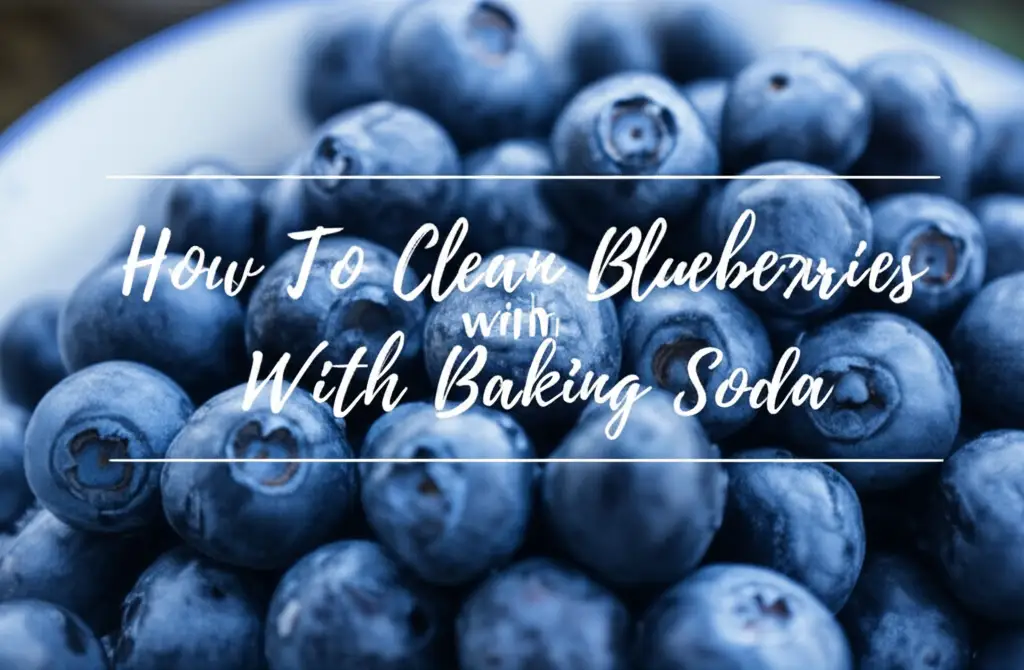· Food Cleaning · 11 min read
How To Clean Wild Blackberries

Clean Wild Blackberries: A Step-by-Step Guide
Finding wild blackberries offers a special joy. You get to connect with nature and enjoy fresh, delicious fruit. But these berries come straight from their natural habitat. They can carry dirt, dust, and tiny insects. Proper cleaning makes sure your berries are safe to eat. It also makes them taste much better.
This guide shows you how to clean wild blackberries the right way. We will cover inspecting, washing, drying, and storing them. You will learn how to prepare these wild fruits for eating. You can enjoy pure, fresh berries from your foraging trip.
Takeaway
- Inspect berries for debris.
- Soak in a gentle water bath.
- Rinse under cool running water.
- Dry thoroughly before storage.
- Store properly for freshness.
To clean wild blackberries, gently pick them over for debris and bugs. Soak them briefly in a water bath, optionally with a vinegar solution, to dislodge impurities. Rinse carefully under cool, running water. Finally, pat them dry before enjoying or storing to maintain freshness.
Why Cleaning Wild Blackberries Matters
Wild blackberries grow in nature. They are exposed to many things. This means they can have dirt, dust, or pollen on them. Small bugs also live on these plants. Sometimes, wild berries can be near areas with pesticides, even if not sprayed directly. Wind can carry these substances.
Cleaning removes these unwanted elements. It ensures your berries are safe to eat. It also helps them taste fresh and pure. You want to enjoy the natural sweetness, not gritty dirt or surprise insects. Proper cleaning gives you peace of mind. This essential step makes sure your foraging efforts lead to a truly delightful snack.
Common Contaminants on Wild Berries
Wild berries often carry specific things you want to remove. Dirt and dust are common from the ground or air. Pollen from nearby plants can also stick to them. Insects, like tiny beetles or larvae, might live inside or on the berries. Bird droppings or other animal residues can also be present. Cleaning removes these items.
Pre-Cleaning Steps for Wild Blackberries
Before washing, you must prepare the berries. This initial step is very important. It helps you get rid of larger debris before any water touches the fruit. This makes the washing process more effective.
First, spread your harvested wild blackberries on a tray or a clean kitchen towel. Do this in a single layer. This allows you to see each berry clearly. Look closely at each berry. Remove any leaves, twigs, or large pieces of dirt. Also, check for any berries that are too soft, squished, or show signs of mold. Discard these immediately. You might see tiny insects. Gently brush them off. For more details on this, you can learn how to clean blackberries from bugs. This visual check saves time later and prevents contamination of other berries.
Tools You Need for Initial Inspection
You do not need many special tools for pre-cleaning. A shallow tray or baking sheet works well for spreading the berries. A clean kitchen towel or paper towels help you gently handle the delicate fruit. A colander will be useful for the washing stage later. These simple items help you prepare your berries for proper cleaning.
The Best Ways to Wash Wild Blackberries
Washing wild blackberries needs care. They are delicate fruits. They can easily get crushed or absorb too much water. A gentle approach works best to keep their texture and flavor. This step is where most of the cleaning takes place.
A gentle water bath is usually best. Fill a large bowl or a clean sink with cool water. Place the berries into the water. Do not overcrowd the bowl. Let them float for a few minutes. Dirt and some bugs will sink to the bottom. For extra cleaning, you can add white vinegar to the water. A common ratio is one part vinegar to three parts water. This soak helps dislodge stubborn dirt and kill mold spores. It also helps prevent mold growth. After soaking, gently lift the berries out of the water. Avoid pouring them out, as you might pour the dirt back onto them. Rinse them carefully under a soft stream of cool running water. Use a colander for this final rinse.
Step-by-Step Washing Process
- Prepare the Bath: Get a large bowl or clean sink. Fill it with cool water.
- Add Berries: Gently place the wild blackberries into the water. Do not drop them in.
- Soak: Let them soak for about 5-10 minutes. Gently swirl the water with your hand.
- Optional Vinegar Soak: If using vinegar, add it now. Let the berries soak for another 5 minutes.
- Lift and Drain: Use a slotted spoon or your hands to lift the berries from the water. Let the dirty water drain away.
- Final Rinse: Place the berries in a colander. Rinse them under a gentle, cool running faucet. Make sure all dirty water washes away.
Drying Your Fresh Wild Blackberries
Drying is a critical step after washing. Wet berries spoil quickly. Excess moisture promotes mold growth. This can ruin your entire batch of berries. Proper drying extends their freshness. It helps maintain their delicate texture too.
Spread the washed berries in a single layer on clean paper towels or a soft, clean kitchen towel. Do not pile them up. You can gently pat them dry with another towel. Be very careful. Blackberries are delicate and can crush easily. Allowing them to air dry on a tray for a short time can also help. Make sure they are fully dry before moving to storage. Any remaining moisture will cause them to become mushy and moldy very fast. Patience here saves your berries.
Why Proper Drying is Essential
Proper drying directly impacts the shelf life and quality of your berries. Moisture creates an ideal environment for mold and bacteria to grow. These can quickly turn your fresh, beautiful berries into a spoiled mess. Drying also helps preserve the berry’s natural texture. Wet berries tend to become soft and mushy much faster. This careful step ensures your cleaning efforts truly pay off.
Storing Cleaned Wild Blackberries for Freshness
Proper storage keeps your cleaned wild blackberries fresh longer. How you store them depends on when you plan to eat them. Correct storage prevents premature spoilage. It also maintains the berry’s flavor and texture.
For immediate use, place completely dry berries in a shallow, airtight container. Line the bottom with a paper towel. This absorbs any leftover moisture. Store this container in your refrigerator. Avoid stacking too many layers. This prevents crushing and promotes air circulation. If you cleaned a large batch and want to save some, freezing is a good option. Spread dry berries in a single layer on a baking sheet. Freeze them for a few hours until solid. Then, transfer them to a freezer-safe bag or container. This prevents them from clumping together. Remember, berries washed and dried carefully last longer than wet ones. Freezing allows you to enjoy wild blackberries months after foraging.
Tips for Optimal Shelf Life
- Do Not Overwash: Only wash the amount you plan to eat within 2-3 days. Wash other berries just before use or freezing.
- Airtight Containers: Store washed, dried berries in containers that seal well. This protects them from refrigerator odors and keeps moisture out.
- Single Layer (if possible): For refrigeration, a single layer prevents crushing and allows air to circulate.
- Paper Towel Liner: Always line containers with paper towels. These absorb any condensation.
- Freeze Individually First: When freezing, flash-freeze berries on a tray. This keeps them from sticking together. Then transfer to bags.
Common Mistakes to Avoid When Cleaning Blackberries
Cleaning wild blackberries is simple, but some mistakes can ruin your efforts. Knowing what to avoid helps ensure your berries stay perfect. It prevents frustration and wasted fruit. Pay attention to these common errors.
Do not wash berries too early if you plan to store them for more than a day or two unwashed. Washing them only just before you want to eat them or freeze them is usually best for unwashed storage. Avoid using harsh chemicals or soap. These can leave residue and affect the berry’s taste. Stick to water or vinegar. Never scrub the berries hard. They are very delicate. Rough handling can crush them or damage their skin. Ignoring thorough drying is another common mistake. Wet berries go bad fast. Always dry them completely before storing. Also, be careful while foraging. Wild blackberries can stain hands and clothes. If you do get berry stains, you can learn how to clean stains on wood or other surfaces from the juice. Be proactive to avoid such mishaps.
Gentle Care for Delicate Berries
Wild blackberries are fragile. Treat them with extreme gentleness at every stage. Drop them into water softly. Lift them with care. Pat them dry instead of rubbing. Do not leave them soaking for too long, as they can absorb too much water and become mushy. Your gentle touch helps preserve their natural texture and prevents bruising. This care ensures the berries remain firm and delicious.
Enjoying Your Clean Wild Blackberries
After all your careful cleaning, it is time to enjoy your wild blackberries. These fresh, clean berries taste amazing on their own. They are a healthy and rewarding snack. You have put in the effort, and now you get to reap the benefits.
You can add them to your breakfast cereal, yogurt, or oatmeal. They bring a burst of natural flavor. Wild blackberries also work well in baking. Make delicious pies, crumbles, or muffins. For a sweet treat, blend them into smoothies or make homemade jam. The possibilities are endless with fresh, clean berries. Share them with family or savor them yourself. Your hard work has paid off.
Creative Ways to Use Fresh Berries
- Breakfast Toppers: Sprinkle fresh, clean blackberries over pancakes, waffles, or a bowl of granola for a quick, healthy boost.
- Baking Delights: Incorporate them into muffins, scones, or fruit tarts. Their natural sweetness shines in baked goods.
- Smoothies and Drinks: Blend them with yogurt, milk, and other fruits for a refreshing smoothie. You can also muddle them for cocktails or lemonade.
- Homemade Preserves: Turn an abundance of berries into delicious jams, jellies, or syrups. These make great gifts.
- Savory Pairings: Try them in salads with goat cheese and nuts, or as a sauce for roasted meats like duck or pork.
FAQ Section
Do I need to wash wild blackberries? Yes, always wash wild blackberries. They come from nature and can have dirt, dust, pollen, and small insects on them. Cleaning removes these unwanted elements, making the berries safe and more pleasant to eat. This step is essential for food safety and enjoyment.
Can I use soap to clean blackberries? No, you should not use soap or detergent to clean blackberries. Soap can leave a residue on the berries that affects their taste and can be harmful if ingested. Stick to plain cool water or a simple water-and-vinegar solution for safe and effective cleaning.
How long do cleaned wild blackberries last? Cleaned and thoroughly dried wild blackberries typically last 2-3 days in the refrigerator. Store them in a shallow container lined with a paper towel to absorb excess moisture. If not dried properly, they may spoil much faster, sometimes in just a day.
Is a vinegar soak necessary for wild blackberries? A vinegar soak is not strictly necessary for basic cleaning, but it is highly recommended. It helps to dislodge stubborn dirt and is very effective at killing mold spores and deterring tiny bugs. A plain water rinse is sufficient for just removing loose dirt.
What if I find small bugs after cleaning? Finding a few tiny bugs after cleaning can happen, especially with wild berries. Most small insects found on fruit are harmless if accidentally ingested in tiny amounts. You can rinse the berries again or pick out any visible bugs. Ensure your initial inspection and washing steps were thorough.
Can I freeze wild blackberries without washing them first? Yes, many people prefer to freeze wild blackberries unwashed. This can help preserve their texture better than freezing them after washing. If you freeze them unwashed, wash them thoroughly just before you plan to use them. This is a good method for long-term storage.
Conclusion
Knowing how to clean wild blackberries properly makes all the difference. You start by carefully inspecting them, removing any obvious debris or spoiled berries. Then, a gentle wash in cool water, perhaps with a vinegar soak, helps dislodge dirt and unwanted pests. The most critical step follows: thorough drying prevents mold and preserves freshness. Finally, proper storage ensures your hard-won bounty remains delicious.
Following these simple steps guarantees you enjoy your wild blackberries safely. You get to savor their natural sweetness without any unwanted surprises. So go ahead, gather those wild treasures. You now have the knowledge to transform them from nature’s gift into a clean, tasty treat. Enjoy your freshly cleaned, perfect wild blackberries!
- wild blackberries
- cleaning berries
- berry washing
- fresh produce care
- bug removal
- food safety
- fruit preparation
- foraging tips




